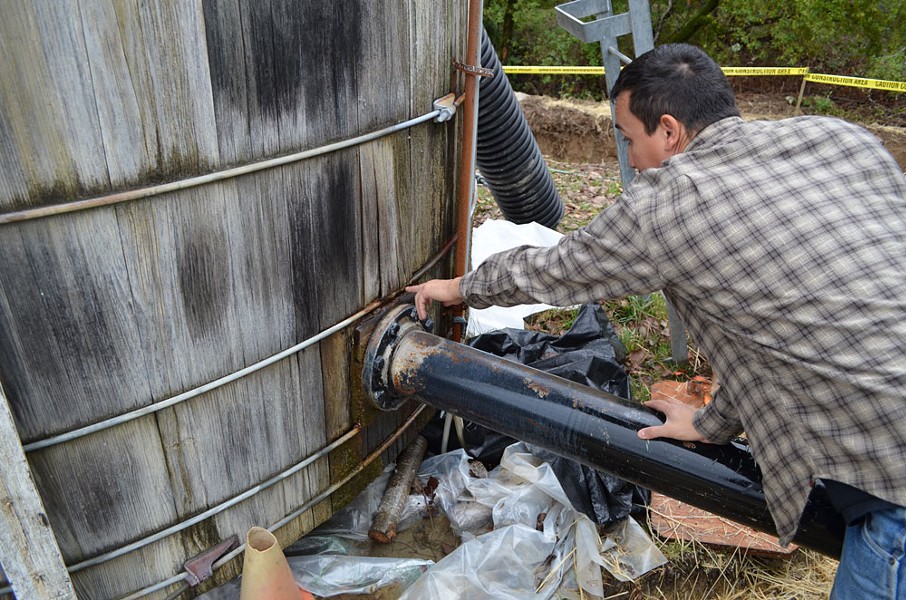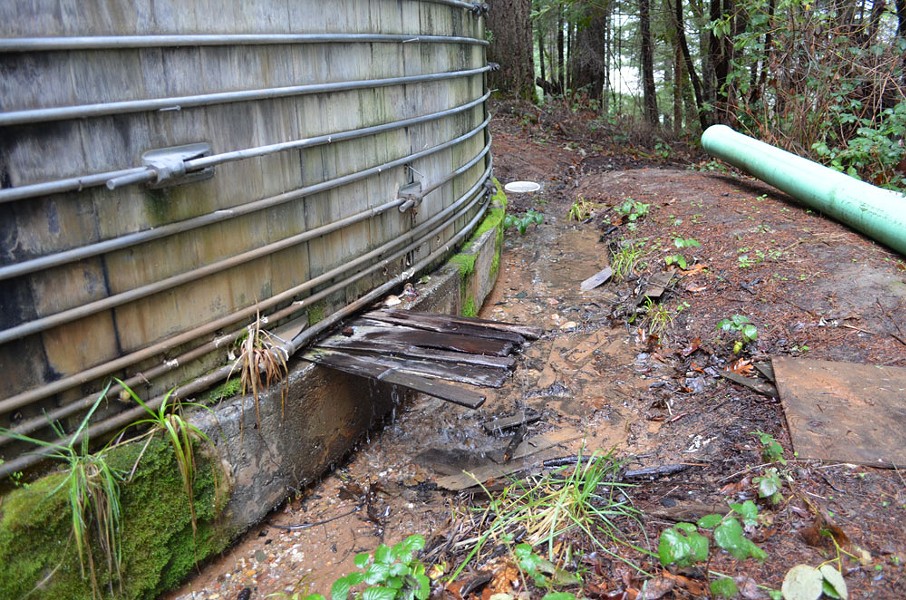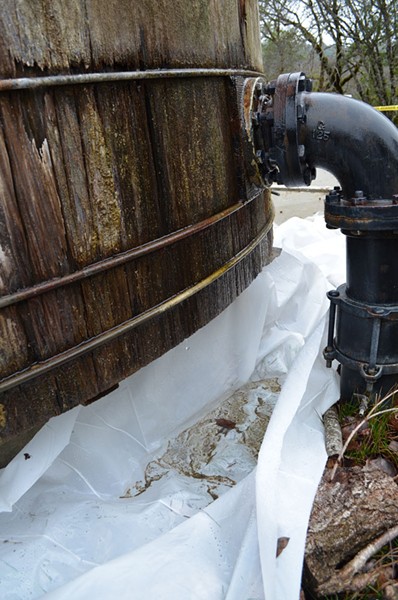There's not much to see on a gray Friday in Alderpoint, the ground still damp from mid-February rains. As you descend into the blink-and-you-missed it town, a ruddy sign points you to the decently-stocked general store, which sits next to a one-pump gas station. Apart from some loose dogs — intimidating at first, but ultimately friendly — there's not much activity in the town of 186 residents, which sits nestled on a flat above the middle fork of the Eel River.
But Alderpoint has a problem burbling up from underneath its pocked roads and looming from the hill above town, a problem facing much of California right now, but taking a particularly frustrating and urgent turn for Alderpoint residents: water.
The Alderpoint Water District is dealing with two rapidly deteriorating storage tanks — tanks that require frequent maintenance that the town simply can't afford. And just when relief seemed imminent following a state grant to fix the failing infrastructure last year, a lawsuit from Eureka-based contractor Mercer-Fraser threatens to stall — or kill — the town's hopes for a water system overhaul.
The fight comes over a public bidding process, and while contracts for public projects are often hotly contested, Alderpoint's attorney has called this one the "most egregious" she's ever seen because it's threatening a town's water supply.
"Both tanks are very old and very leaky," said attorney Clare Gibson. "I've been told by an engineer with the Department of Public Health that one of them is in danger of imminent collapse. The wood was described to me as spongy — it's not a good situation."
Alderpoint — which sits about 11 miles (or 30 minutes) east of Garberville — is in the heart of marijuana country, but it doesn't fit that image of grand ranch homes and high-tech greenhouses on vast green acres.
"It's not a hardcore pot town," says Alderpoint Water District employee Erick Arcos, though, he admits, "everybody in the summertime grows a little bit."
In fact, Alderpoint is almost Appalachian in appearance: A little neighborhood with abandoned cars, run-down homes and battered pickups. Arcos, a former town resident who now lives over the hill in Redway, points out the unofficial "mayor" of Alderpoint, who tools around in his pickup truck looking for conversation, unable, on this quiet afternoon, to find much of anyone to talk with. The town is charming, yet insular. "You can tell how old this town is by looking at the houses," Arcos goes on. "We're not what people think of as your rich, SoHum pot growing community. Everyone here works. Everyone has jobs." Those jobs, Arcos says, range from store and gas station employees to tradesman, machine operators and carpenters. Others — including the water district's secretary — work for Casterlin School, about seven miles down the road in Blocksburg.
Down the street from the post office — which is threatening to close — sits the Redwoods Rural Health Center, a clinic that opens its doors once a week to serve residents of Alderpoint and beyond.
At the high point in town, in a bright clearing surrounded by a thick stand of trees, looms a creaky, leaking water tank. The redwood slats are stained with age and dampness and seem to bulge between the banded cables that struggle to hold the tank together.
Water seeps and gushes from several points around the bottom of the tank, creating a small channel that circumnavigates the concrete foundation, collecting at the low point and pouring downhill through a gully carved out of the clay earth. Several hundred feet downhill, the water pours out onto Alderpoint Road. The stream is a year-round fixture, giving Arcos a kind of canary-in-the-coal-mine alert on his regular trips into Alderpoint. "It just never stops flowing," he said. "If you don't see water on the road you know there's a problem up here."
All told, more than 3.5 million gallons of water pumped from the Eel River spill out of the Alderpoint water tanks and leaking pipelines every year, Arcos said. There's so much water on the ground around the tank, the district brought out an ecologist before construction began to see if the tank had created a wetland. It hadn't.
Cotton-tipped sticks dot the outside of the tank like arrows shot from a sieging army — Arcos' shims and stop-gap measures. Sprung a leak? Jam a redwood shim and some cotton in there. The redwood will swell up as it gets wet, plugging the gap. It's old technology, temporarily effective, but time-consuming and counterproductive in the long run. "Too many shims might end up puncturing more," Arcos said.
Closer to the Eel, Arcos shows a similarly struggling tank at the powerhouse, where water is treated and pushed uphill into the main tank. A stick propped against the ground holds slats in place. Arcos said he's had to drain the tank four times in order to make repairs from the inside. That involves donning a harness and chemical clean suit, while someone belays him from outside of the tank. "It's a whole ordeal," he said.
Inside the pumphouse a small tangle of pipes sprouts from the ground. Piles of redwood shims and other supplies are stacked around the cramped shed. A laminated map of the town's water distribution system hangs on the wall. The system is relatively simple, Arcos explained, something that he's grateful for, considering how complicated and expensive modern, automated systems can get. "I feel blessed — this is old baby-boomer technology."
With no filtration system, the water supply is out of state compliance, Arcos said, though there's a grandfather clause that keeps them operating. "We need filtration. We want to be up to par with all regulations." While the town is on a "boil order" — at least some residents must boil water before drinking, brushing their teeth or cooking with it to avoid contracting giardia — Arcos says the turbidity is naturally low. Chlorination is supposed to kill microbes and make the water supply safe, but Arcos said those nearest to the treatment center get water before the added chlorine has had much "contact" — making it less effective.
Alderpoint General Store employee Kim Hintz served on the water board years ago, and said she doesn't drink the water unless it's boiled. It tastes too much like chlorine, she said, though showering in it is tolerable. "Our water district is doing the best that it can," she said. "On a normal day-to-day basis, I don't think anybody drinks the water."
The water district is essentially a one-man operation, with a board of six Alderpoint residents. Arcos — the only employee — tries to volunteer some time, since working 40 hours a week would bankrupt the district, he said. "This town doesn't really have money to keep doing repairs."
It's not just Alderpoint that relies on that 100,000-gallon tank on the hill. Fire departments in nearby Zenia and Blocksburg turn to the district during emergencies as well, Arcos said. Despite its problems and potential collapse, he said the Alderpoint tank remains the most reliable supply of water in the area.
The lawsuit that threatens to grind construction to a halt is based on technicalities in the highly competitive world of public projects bidding. When a public agency wants to contract work through a private company, it must ask competing businesses to submit proposals and select the lowest bidder that meets requirements or guidelines developed by the agency. The idea is to prevent corruption by keeping agencies from awarding lucrative contracts to friendly interests, and to ensure tax money is being spent frugally and districts are getting the best deal.
After 10 years of trying to secure money for repairs, the Alderpoint Water District received around $2 million in state funding — part of $3 billion in water infrastructure bonds approved by California voters in 2002 — to repair the failing water system. With engineers from LACO Associates, the district drew up plans to replace the aging redwood tanks with stainless steel ones and to replace the district's transmission lines that deliver water from the hilltop to customers. Some of the grant funding went to LACO's work, which determined that estimates should come in around $1.36 million. Arcos said the district — factoring in possible change orders that could increase the project's eventual cost from the bid amounts — decided it couldn't award a bid for much more than $1.4 million.
The original bids — submitted in early 2013 — all came in above the amount that the district was awarded by the state, so the district again asked for bids, this time taking out the portion of the project that would replace transmission lines.
As of the Aug. 12 deadline, four bids had been submitted to the water district. Cal Electro, out of Redding, was the lowest bidder at $1,413,700. Mercer-Fraser was the third lowest bidder at $1,591,000. The highest bid came in at nearly $2 million.
The water district, after reviewing the proposals, selected Cal Electro to perform the work. Mercer-Fraser protested the bid shortly after.
"They didn't actually protest against the bid itself, but made this hyper-technical argument that Cal Electro failed to properly submit its past reference projects and that it's not as qualified as Mercer-Fraser to do the work," said Clare Gibson, the water district's attorney in the matter.
Mercer-Fraser President Justin Zabel did not return multiple calls requesting comment on the case.
Mercer-Fraser's attorney, Jennifer Dauer, whose expertise is also in public bidding law, said she wouldn't get into underlying reasons for the company's lawsuit, citing client privilege.
Mercer-Fraser's petition for writ of mandate, filed Oct. 22 in Sacramento Superior Court (the petition was filed in Sacramento because the project involves state-issued funds), points out that Cal Electro did not submit references requested as part of the water district's original bid package by Aug. 12. The references that Cal Electro provided — apparently on the water district's request the day following the bid package due date — showed that Cal Electro was not qualified for the project, Mercer-Fraser argues.
"... Cal Electro did not submit, and could not submit, three references from projects completed within the last five years which were of 'similar scope' to the project," the filing reads. The references also included many projects completed more than five years prior to the bid due date, Mercer-Fraser argues, going beyond the range of requested references.
"Requiring references is very common in public contracting," Dauer said. "You have to evaluate whether or not a bidder has the appropriate contract."
Mercer-Fraser, the suit argues, should be awarded the contract because Cal Electro didn't fulfill the bid requirements.
Gibson, who says she's been practicing bid law for 15 years, disagrees. "The references are really separate and independent of the bid — a way to provide information so the district and engineer can follow up before they award the contract," she said. "In other words, the response to the bid protest was pretty much a 'so what?' Actually, the response was more polite than that."
But Dauer said references are important to the public interest. "Once a district decided what mininum experience it required of the bidders, they couldn't later on say 'we changed our mind we didn't need that.' There could have been other bids."
Gibson said Cal Electro is "more than fully licensed to do the work." On Feb. 28 a Sacramento Superior Court judge will rule on a Mercer-Fraser-requested injunction, which seeks to stop state funding for the project until the lawsuit can be settled.
In its argument for an injunction, Mercer-Fraser said it only sought to stop the state Department of Public Health from issuing funding for the ongoing construction. "By enjoining only DPH, the District and Cal Electro can decide whether to continue with the project work," the filing reads.
But Cal Electro President Bob Meissner said the injunction, if granted, would essentially stall the project. "We would stop work," he said, adding that there would be a "substantial cost to the Alderpoint Water District" to resurrect work abandoned partway through. "Quite frankly, it's a waste of money. The money that's going to be expended won't be recouped in a better product."
Cal Electro has been working on the system for about two months, Meissner said. The company has poured foundation for a new tank at the lower site, and is digging a vaulted basement chamber for a treatment station. Up the hill at the big tank, the contractor moved an electrical pole and began spotting a pipeline in preparation to pour a foundation. Dry weather allowed the project to get ahead of schedule, Arcos said, and barring a stop in construction he expects the big tank will be in use by August.
Arcos, Gibson and Meissner say Mercer-Fraser's efforts are harming the people of Alderpoint, holding up repairs on a crucial water supply on the verge of collapse.
But, in its argument for an injunction, Mercer-Fraser argues payments made to Cal Electro for ongoing construction are actually harming the public. When it's shown that the Cal Electro contract was improperly awarded, it argues, the water district will have already spent money on construction — money it's unlikely to get back.
In supporting the request for the injunction, Mercer-Fraser's Zabel wrote:
"In the past, Mercer-Fraser has elected not to bid on projects for which it has the necessary experience but which either require little, if any, specialized experience or do not require references or otherwise state an experience standard. Such projects are likely to attract bids by less experienced contractors, who are more likely to underbid experienced contractors such as Mercer-Fraser out of lack of familiarity with the work required or in an attempt to obtain experience for other projects."
Disputing bids for public contracts seems to be a reality in an industry that sees lots of public money awarded for construction projects — Meissner's no stranger to that.
"We've been on both sides of the fence. We've been a second bidder. Sometimes we question if the lower bidder is the best for that job," he said. "We feel strongly that it should not be the high bidder that determines that the successful bidder is qualified or not. In the end, the engineer and the owner is the one that's going to have to live with the work."
And this isn't the first time that Mercer-Fraser has disputed a bid. The company successfully overturned a $1.25 million contract for sewer line repairs in Crescent City last year, despite being the higher bidder by $40,000. After the city council awarded a contract to Del Norte-based Hemmingsen Construction, Mercer-Fraser protested the bid, saying Hemmingsen's submittal fell short of the bid request guidelines. After considering the protest and the prospect of a lawsuit against the city, the council rescinded the award to Hemmingsen and contracted Mercer-Fraser to do the work. According to reporting by the Del Norte Triplicate, Councilwoman Kelly Schellong expressed disappointment that the city wouldn't award the project to a local contractor, but conceded at the threat of a lawsuit that could impact the city's ability to get future grant money.
City attorney Bob Black said bid protests are somewhat common, adding that the sewer contract was a difficult decision. "It's a fairly easy thing for a contractor to do — to look at a lower bid and then to just find something that is wrong and then protest that," he said. "The real question is the merits of that protest. We decided that Mercer-Fraser had, somewhat, the better argument."
Arcos likened the water district's struggle with Mercer-Fraser to a David-vs-Goliathesque battle: a tiny, penniless, overlooked town forced into a fight with a powerful construction company with deep pockets. He's confident that the water district will prevail against the injunction and the lawsuit, though he said the district has spent $20,000 on the legal fees — money that it would have preferred to spend on repairs.
While replacement of the tanks is in the foreground, Arcos is anxious to get repairs made to the transmission lines, particularly since he's not sure if new tanks will increase the pressure on existing lines. "You need something new connecting the two in the middle," he said.
Arcos predicts that the district will save money on electricity by not having to pump the extra 3.5 million gallons of lost water uphill every year, allowing that money to go toward repairs of other infrastructure.
Along with leaks from the tanks, water pools at several spots around town where underground pipes are leaking. But digging up the roads means more money and more work, including a road-flagging crew and safety oversight. Much of that, Arcos suspects, would be volunteered by the community. "Our community will step forward and volunteer their time," he said. For now, they're counting on getting as much done as possible with state funding.
Meanwhile, the district prepares for a showdown in Sacramento on Feb. 28, when a judge will hear arguments for the injunction. (Check the Journal's blog for results of that hearing.)
The lawsuit is perhaps most frustrating, Gibson said, because Mercer-Fraser has nothing to gain. The company's bid came in higher than the state's award for the project, she said, meaning even if Mercer-Fraser was the only company to apply for the contract, the district wouldn't have been able to award it to them."For reasons that I cannot fathom, Mercer-Fraser will not go away," said Gibson. "It's so inexplicable and it's so wrong. I'm shocked by it and I don't say that lightly."
But Mercer-Fraser's attorney Dauer was dubious of that assertion. "I think it's highly speculative," she says. "They are certainly taking the position that there was an absolute amount of funding and they couldn't spend a dollar more. That may or may not be true. Between the choice of letting it fall apart or finding some additional money they very well may have been able to find the money."
Arcos said his emotional appeals have fallen on deaf ears. "We are almost crying out in our letters," he said. "They know people depend on this water to live. Why won't you help the sleepy little town over the hill?"











Comments (3)
Showing 1-3 of 3